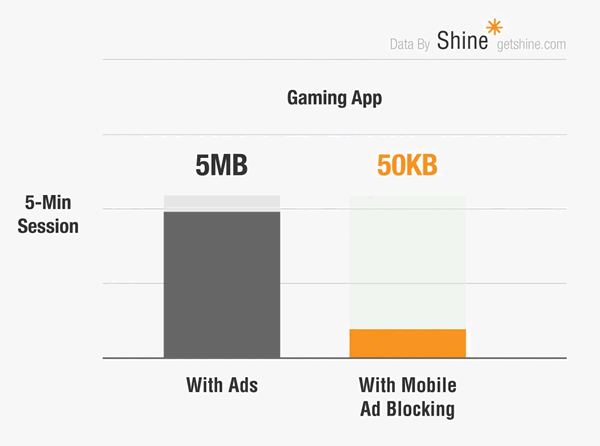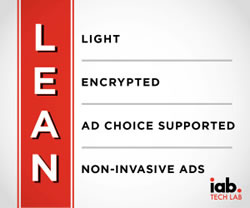 “Ad blocking is a consumer right”. That’s the message you get when visiting the website and Twitter account of Shine, an Israeli ‘ad control technology’ company that moved from the mobile security space to the ad blocking space with a different model than your usual ad blocker.
“Ad blocking is a consumer right”. That’s the message you get when visiting the website and Twitter account of Shine, an Israeli ‘ad control technology’ company that moved from the mobile security space to the ad blocking space with a different model than your usual ad blocker.
I wouldn’t have talked about ad blocking nor Shine if it wasn’t for a recent initiative by the company I happened to stumble upon: a print ad in the Financial Times to remind the IAB and ad (tech) industry of its fight against the lobbyists who will certainly continue to counter ad blocking (that much is true).
Ad blocking is a given – deal with it
Let’s be clear: I have nothing against ad blocking.
I also agree that ad tech and the ad industry didn’t really think ‘experience’, ‘relevance’ and ‘user’ when it boils down to online ads (there are much better ways to build customer intimacy) and that organizations such as the IAB messed up too, as they said themselves. For ages we’ve seen the advent of ever more, bigger and ‘in your face’ display ad formats and lately recommendations regarding native (which has nothing to do with content marketing) to the arsenal of ways to push through. Note: this doesn’t mean I’m against advertising as such, I just loathe the ongoing efforts of many advertisers to stick to their pure push mentality, hiding behind newer technologies when these technologies enable them to do much more than that as the best agencies and advertisers understood.
The ad industry was ripe for disruption since quite some time and that’s what it’s going through, just as the media industry is going through solid digital transformations and marketing as a function transforms. Ad blocking is a given and I am even a bit surprised when publishers say that ad blocking is theft. My law school roots from a previous life say that as such it is not. There is no binding contract between an Internet user and a website that stipulates anything like this. If media want to react to the ad blocking challenge by having such a contract or finding alternatives, so be it. Then the choice is the consumers’ who agrees or doesn’t. Simple as that. You can’t speak about theft if something is stolen that you don’t own and advertising revenues are not a property that is protected or contractually agreed upon, unless otherwise stipulated. That doesn’ mean I don’t like publishers or (real) journalists, well on the contrary. But it is what it is and we need to adapt one way or the other.
Talking about consumer rights
The often cited fact that advertising keeps access to media and content on the Web free in most cases is true. But you can’t expect anyone to think that way, let alone see it as more than a silent contract in the non-legal sense of the word. So, yes, ad blocking is everyone’s right, also in the non-legal sense. If you loathe ads, then you block them if you can.
If blocking is a consumer right, the opposite is true as well: seeing ads and agreeing with that silent notion regarding a ‘quid pro quo’ of the ‘free’ Web is also a right but that is something Shine doesn’t leave up to the consumer but to other commercial entities who decide for them as you’ll read.
Ad blocking in reality is becoming big business and everyone wants a share in a game which is about control and hard cash, both in the ad industry ecosystem as in the ad blocking space itself. And as it seems, fighting for the consumer’s right to block ads pays. Unless ads in the Financial Times can be afforded by start-ups with – as far as we can tell – one customer of course.
Let’s go back a step. What are we talking about: ad blocking a consumer right? Let’s even forget consumer rights that are far more essential and think about companies that seem to have the urge to defend our rights, my rights and your rights. As such nothing wrong with rights but what’s the reality behind that urge, certainly if the company is funded by other companies with more than one stake in the whole game (and no, not everyone wants to block ads).
Let me suggest another consumer right for you: universal, cheap, open, wireless and uncensored access to the (mobile) Internet is a consumer right. There you go. Open up the (mobile) Internet access market, pull away government funding from operators where it still exists, go for free competition all the way, disrupt the market and remove all stipulations regarding the switching of providers or other regulations standing in the way of consumer choice. In markets where operators have been funded with tax payers money we could ask that money back to invest in universal mobile Internet or to sponsor new media models. And let’s not forget Net neutrality while we’re at it. Seems like more than one consumer right that’s as valid as the right to block ads, doesn’t it?
But it’s probably not what Shine wants as far as the rationale behind its business model goes. I know: operators and telcos have to invest in their infrastructures and have costs. So do media. And all other industries for that matter. What is puzzling me more is that business model of Shine. In a nutshell: the company has ad blocking technology which it licenses to operators. How these operators use that technology is totally up to them.
The core rationale of Shine: media and advertisers profit from the investments mobile operators have made because all those ads eat away bandwidth and resources from the consumer and his mobile data plan and from the operator (for which we, consumers pay).
The choice to block ads is the decision of the operator in the Shine model
When you check out the website of Shine you can read that ‘carriers are giving subscribers the choice to block ads’. Well, that’s not true. Operators, the core target customers of Shine, have the right to use the technology of the company the way they want. As a premium service for subscribers, as just part of their operator package, as a ‘differentiating’ benefit, as whatever. Either way you look at it: regardless of how operators use it, it’s about money and operator control, right?

In fact, the company’s first customer, Jamaican Digicel doesn’t offer choice to subscribers. It just blocks ads with the exception of some media as Shine’s ‘ad control technology’ is simply implemented. Quoting CEO Denis O’Brien from the press release: “Companies like Google, Yahoo and Facebook talk a great game and take a lot of credit when it comes to pushing the idea of broadband for all – but they put no money in. Instead they unashamedly trade off the efforts and investments of network operators like Digicel to make money for themselves. That’s unacceptable, and we as a network operator, are taking a stand against them to force them to put their hands in their pockets and play a real role in improving the opportunities for economic empowerment for the global population.”
Fortunately there is good news for O’Brien (except for the warning of the Irish regulator). He can now make more money thanks to striking deals with media partners who want their ads to be seen across his operator’s network. Or as the press release says: ‘Calling for ad networks like Google, Yahoo and Facebook to enter into revenue sharing agreements to bridge the digital divide’.
While there is nothing wrong with revenue sharing and there is certainly truth to O’Brien’s statements, among others when he emphasizes the digital divide and challenges in developing countries when it boils down to Internet access, it can’t be said that the deal is one whereby ‘carriers are giving subscribers the choice to block ads’.
Business Insider reminds us that O’Brien also owns European media holding Communicorp, operating some radio stations, has a major stake in Independent News a Media, which is in control of a few leading media and is Ireland’s richest man. Nothing wrong with that either. Being rich is just another consumer right, isn’t it?
Ad blocking as a business: caring about users or following the money?
Will operators working with Shine be able to make revenues by asking fees to advertising networks or media and thus share the revenues? The answer is simple: if they have de facto monopolies in their regions (a term that in some countries is well-known in telco land in other contexts) or at least have enough scale they most probably will. After all, Germany-based eyeo, the developer of popular AdBlock Plus already get paid by companies such as Google to fit in its ‘acceptable ads’ policy.
Shine says it protects users too. The company estimates, again according to Business Insider, depending on where you live ads use up to 10-50% of user’s data plans and adds a graphic to illustrate that. OK, let’s assume that’s right. My operator knows that enabling me to check the status of my data plan at any time makes me a happy customer but I guess that’s not always the case.

Time to follow some money. Shine has received $3.3M in 2 rounds from 2 investors CrunchBase tells us. The first one is Horizons Ventures, founded by Solina Chau, Li Ka-shing and Debbie Chang. As Business Insider also reminds us, Li Ka-Shing is the ‘billionaire chairman of Hutchinson Whampoa’.
In the portfolio of that conglomerate: telecommunications and operators indeed. Hutchinson Whampoa also has stakes in Facebook, Spotify and Siri, Business Insider writes. And in the same Business Insider article, Shine CMO Roi Carthy, who is also managing partner at the second investor, Initial:Capital (and previously worked for TechCrunch), is quoted saying that the ad blocking technology of Shine won’t siphon out native ads on platforms such as Facebook, Twitter and BuzzFeed as these are an “intrinsic part of the user experience”.
Relevance and consumer rights – just keep your hands off my experience
Maybe it’s all a coiincidence but here’s the thing: relevance and ‘making a better Internet for everyone’, as eyeo puts it on its website is what we dream about and have been advocating since…ever.
However, when companies start talking about consumer rights a small alarm bell rings in my head. Especially when these companies hand over or, better, sell (I presume the licenses come with a price) the decisions over the (mobile) Internet experience to operators you can wonder about the claims regarding ‘giving’ power/control/choice to consumers as what essentially happens is a shift of revenues and power from one industry to another or potential alternative revenue sharing models that benefit both or more. Unless I’m missing something here.
The whole ad blocking debate is largely to be seen in the disruption of the (digital) advertising industry and most certainly in the context of the battle of the giants (Facebook, Google, Apple) and power plays that have far less to do with consumer rights than with mucho money. What Shine essentially does – whether it wants it or not (you’re the judge of that) – is making sure that operators can get a seat at the revenue table, regardless of their investors or how potential future customers (operators) want to embed, sell or market their ad blocking features if they work with the company. This isn’t an opinion by the way. It’s simply (a consequence of) the business model.
Where Carthy says, and I quote from Business Insider once more, “We believe ad blocking is a right, full-stop. If the consumer decides to use it, we believe that it should be their right, and they should be able to do it with full integrity … nobody [in business] has a god-given right to exist” one could of course answer that the same goes for any industry whatsoever. There are no god-given rights for mobile operators to exist and, yes, they do feel the margin pressure just like anyone else.
Shifting the power and control from Madison Avenue to Operator Road or ‘sharing it’ is not exactly what comes to mind when I think relevance, consumer rights, choice and all those fancy words we hope advertisers really live up to, right? Unless of course operators and the people and investors behind Shine are saints or true white knights, fighting for a better Internet for you, me and the whole mobile Web population.

Anyway, here’s a message to my operator: please keep your hands off my experience and my ads. I’ll decide if I want them or not, if needed using an ad blocker – or not or maybe or then again yes or not after all – that’s the thing with consumer choice and rights – the freedom to change your mind.
As for the ad industry it’s wait and see what the IAB will do with the whole ad blocking challenge – or call it a reality. Thus far and based on first reports let’s say we haven’t really been impressed.
The platforms, ad networks and whole ecosystem, including giants like Facebook, are concerned. But, regardless of disruptions, changes and uncertainties: what consumers and organizations do deserve is clarity and the absence of potential cowboys, which doesn’t refer to the companies mentioned in this post. You’re the judge about what matters and what doesn’t as always and as the best brands understand.
Towards new normals and new disruptions – also for mobile operators
Does all this mean that advertisers don’t need to make their ads better, more contextual and ‘lighter’? Does this mean that operators have no place at the table? Of course not. I’m trying to make a point on claims about consumer rights.
Everyone has a role when it boils down to relevance and experiences and everyone has the right to make money. A few months ago there were rumours that several European operators are talking – and according to some eager to work – with Shine and they can if they want, even if ad blocking on a network level would cause quite a stir, despite what some claim also in the regulation space.
But in the end the consumer calls the shots and disruptors find shortcuts in the last mile of the experience, they always do. Evolutions towards ‘new, lean and collaborative normals’ (plural indeed) are upon us and it will take more than a few parties around the table, including mobile operators, manufacturers, browser developers, whatever.
Wait and see. And stand by for the disruption of the operator industry with the arrival of the Internet of Things and without a doubt players that have no ties with any of the mentioned industries and won’t wait for these industries to innovate, transform and disrupt themselves, something we haven’t been seeing too much in the operator market with its incumbents. Just a thought: how relevant are operator brands still in the eyes of a generation that thinks Internet on mobile is like electricity, simply a utility and even commodity?
In the meantime think about other ways than simply ‘heavy’ and intrusive ads and take a stand with respect to customer experience and user experience as a way to build customer intimacy, respecting data and privacy. And of course optimizing with the customer/user/stakeholder first, always.
Disclaimer: this post reflects the opinion of the author and in no way is sponsored or endorsed by any ad blocker, advertising industry body or partner/customer from the past, present or future. It does not endorse ad blocking nor stopping ad blocking as that is entirely up to you as is your opinion on the topic or the mentioned companies.
Top image purchased under license from Shutterstock

